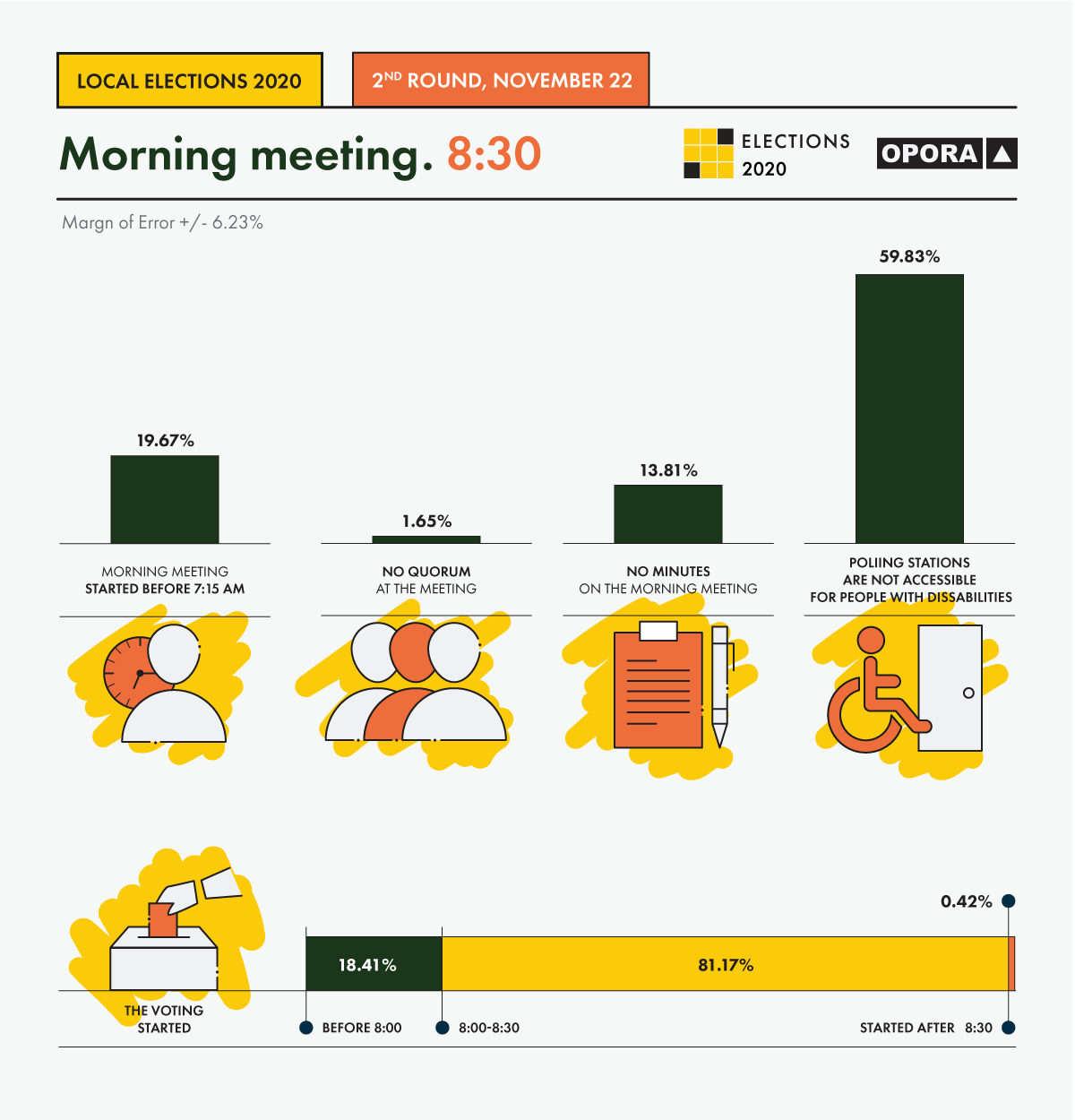On 22 November, the second round is being held in Berdiansk (Zaporizhia oblast), Dnipro, Drohobych (Lviv oblast), Lviv, Mykolaiv, Nikopol (Dnipropetrovsk oblast), Poltava, Rivne, Sloviansk, Donetsk oblast, Uzhorod, and Cherkasy. OPORA's observers provide the assessment of electoral procedures in the second round, representative for precincts, formed in the corresponding cities. OPORA's analysis shows that PECs started the second ballot without significant organizational problems, but with some procedural violations were present. The voting process is ensured by the authorized PECs, despite the further intensification of the pandemic and the low financial motivation of commission members to exercise their powers. Almost 60% of polling stations were not fully equipped for easy access of voters with disabilities to the premises. Thus, the state and local government bodies should further improve the inclusiveness of election process.
According to OPORA, 19.67% of PECs have violated the Election Code by starting a preparatory meeting ahead of schedule. The PEC meeting, which should begin not earlier than 45 minutes before the start of the vote (07:15), involves important procedures to prepare for the voting process. In particular, commission members inspect and seal ballot boxes, throw control sheets into them, PEC members received ballots, etc. If preparatory meeting is held earlier than established by the Code, electoral subjects can not ensure observation in line with the procedures. According to OPORA's analysis results, the preparatory meeting has started before 7:00 AM in 1.26% of PECs, and after 7:00 AM but earlier that the required time in 18.41% of PECs. At the same time, 80.33% of PECs have the started their preparatory meetings on time.

Despite negative expectations concerning the quorums in PECs because of the pandemic and enhanced quarantine, only 1.65% of PECs held their preparatory meetings without a quorum. 98.35% of PECs started working in compliance with the quorum requirements at their meetings. Given most of the first PEC meetings had a quorum, the commissions will be able to eliminate violations and count the votes in plenipotentiary powers.
However, PECs committed some procedural violations when preparing polling stations for opening. 13.81% of PECs didn't keep the minutes of their preparatory meetings, although this is required by the Election Code. Significant rotations in PECs and the lack of time and resources to train commission members result in procedure violations. As OPORA has already noted in its interim reports on 2020 local elections, we see from the experience of the local election campaign that improvement of the election administration system in Ukraine needs to be discussed at the level of parliament and expert organizations.
Similarly to the first round, polling open to citizens at 08:00 AM on the second round election day. OPORA has assessed how well PECs followed the requirements for opening of polling stations. Thus, the voting started at 18.41% of polling stations before 08:00 AM, and at 0.41% - after 08:30 AM. Voters were given the opportunity to vote on time at 81.17% of polling stations.
OPORA has assessed the accessibility of polling stations for people with disabilities. According the assessment, 59.83% of polling stations were either not accessible to voters with disabilities or accessible to the certain extent. Only 40.17% of polling stations have ensured a properly access for voters of this group.
OPORA's observers had problems with observation at 1.25% of polling stations, while 98.75% of PECs provided the opportunity to observe all procedures without exception.
OPORA has deployed observers to 300 polling stations, located evenly throughout the country. Before the observation, OPORA held 2 rounds of trainings and special Election Day simulations, involving possible situations and incidents. The observers were deployed based on random stratified sampling. The maximum margin of error for this report is below 6.23%. OPORA's statistically based observation is an independent activity, realized exclusively by OPORA, aimed to provide Independent information on the course of election.
